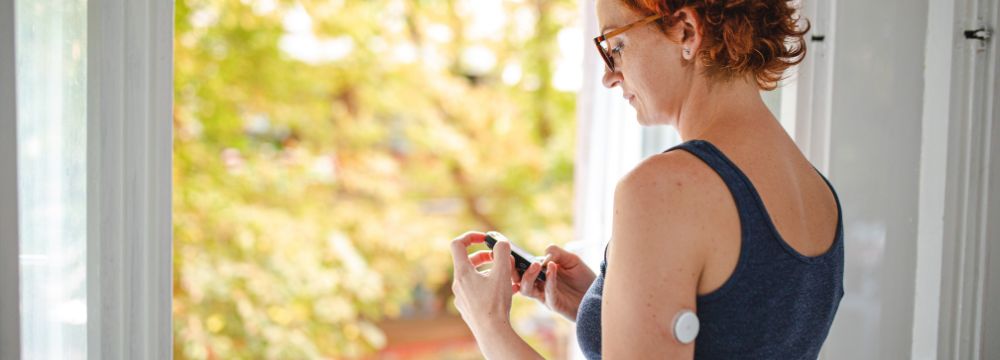Should You Use a Continuous Glucose Monitor if You Don’t Have Diabetes?

We live in a world of self-diagnosis. Gluten sensitivity, allergies, ADHD, you name it – it’s all diagnosed and discussed online…seemingly everywhere. But monitoring your glucose isn’t something to mess around with. So, if you don’t have diabetes or have had bariatric surgery and your diabetes is now in remission, you may wonder if you need a continuous glucose monitor (CGM). It’s a common concern, and it’s okay not to have all the answers. That’s why you’re here. Check out the rest of the blog to see if a CGM makes sense.
What Is a Continuous Glucose Monitor?
A CGM is a small medical sensor applied to or under your skin that continuously measures your blood glucose levels, hence the name. It can show your blood sugar levels in real-time to detect problematic lows and allow you to correct them quickly. Under your doctor’s supervision, you can also use these CGMs to adjust insulin doses for better blood sugar control and understand what foods or drinks make your blood sugar spike. CGMs are used by patients with both type 1 and type 2 diabetes and those prone to severe hypoglycemia. More research needs to be done on the benefits of these monitors, physical or psychological, and people without blood sugar issues.
New Marketing Toward Non-Diabetics
Do a Google search for continuous blood glucose monitors, and you will undoubtedly find advertisements for CGMs specifically created for non-diabetics. Subscription plans can be upwards of a few hundred dollars a month which may or may not be FSA/HAS eligible depending on your plan and medical status. That said, many purveyors make it seem like continuously monitoring your glucose can optimize your food and drink consumption to the point where your body is optimized for weight loss and peak performance.
To be sure, consistent blood sugar level monitoring can help you understand how your diet and lifestyle affect you, specifically. It can be scary to see a reading you don’t like, but it will encourage you to get your health back on track, and sometimes that’s all you need. It may cost you financially now, but diabetes can cost you a lot more in the future.
Are Weight Loss Claims Legitimate?
Knowing your blood levels can be very interesting, and this curiosity is taken advantage of with many “disruptor” technologies in healthcare. There is some truth to the fact that knowing what spikes your glucose can help you optimize your diet. However, information overload is also a problem; in the end, this is a behavior modification tool. Whether you have had bariatric surgery or not, optimizing your diet with our practical advice is a tried-and-true weight loss method that has worked for millions before you. Having a continuous blood glucose monitor may be fun, but you can regulate your blood sugar levels through traditional means the majority of the times.
There Are Other Potential Cons:
CGMs can cost you a pretty penny. Health insurance may cover the costs for people with diabetes, but if you aren’t officially diagnosed, you could have trouble getting the cost underwritten. If you have been diagnosed with diabetes and have insurance, you could be looking at anything from several hundred to a few thousand dollars a year, depending on your plan. Without insurance, this cost figure can jump even higher. It’s a pricey investment, so it’s wise to research if you truly need it.
CGMs won’t make you bionic, and the application or implantation can cause discomfort. The insertion process is painless for the most part, but some people have experienced itching around the sensor.
Is it accurate, at least? Well, it varies. Usually, CGMs are accurate with their readings but are prone to occasional mistakes. You will likely need to confirm readings with a traditional blood glucose meter.
A False Sense of Security
Notably, there are decidedly bad foods that do not immediately spike your blood sugar. These are usually foods that contain fructose. For example, sodas sweetened with high fructose corn syrup may not spike your blood glucose levels as quickly as sugar-based soft drinks. However, they are just as bad, if not worse. Rather than immediately entering your bloodstream, fructose is processed by the liver, which converts it more slowly into glucose. This strain on the liver can cause long-term issues, and the blood glucose monitor may not alert you. In other words, practice common sense and understand that proper diet and exercise are the best ways to maintain good health.
So, Should You Use It? It’s Not the Answer You Want to Hear, but… It Depends.
As mentioned, for those with type 1 and poorly controlled type 2 diabetes, a CGM may be a necessity. But if you don’t have diabetes, have the money to invest in a CGM, and are very concerned about your glucose levels, purchasing it even without insurance may be an investment in your peace of mind. For most of us, the benefits do not justify the high cost, and these devices may even make us paranoid about our health.
And importantly, if you are not controlling your diabetes, you should see a medical professional as soon as possible. Known as the silent killer, type 2 diabetes can cause significant problems around the entire body. Bariatric surgery, and specifically gastric bypass, are excellent ways to address uncontrolled type 2 diabetes while also helping patients lose weight. We encourage you to contact us and learn more about your diabetes management options.

